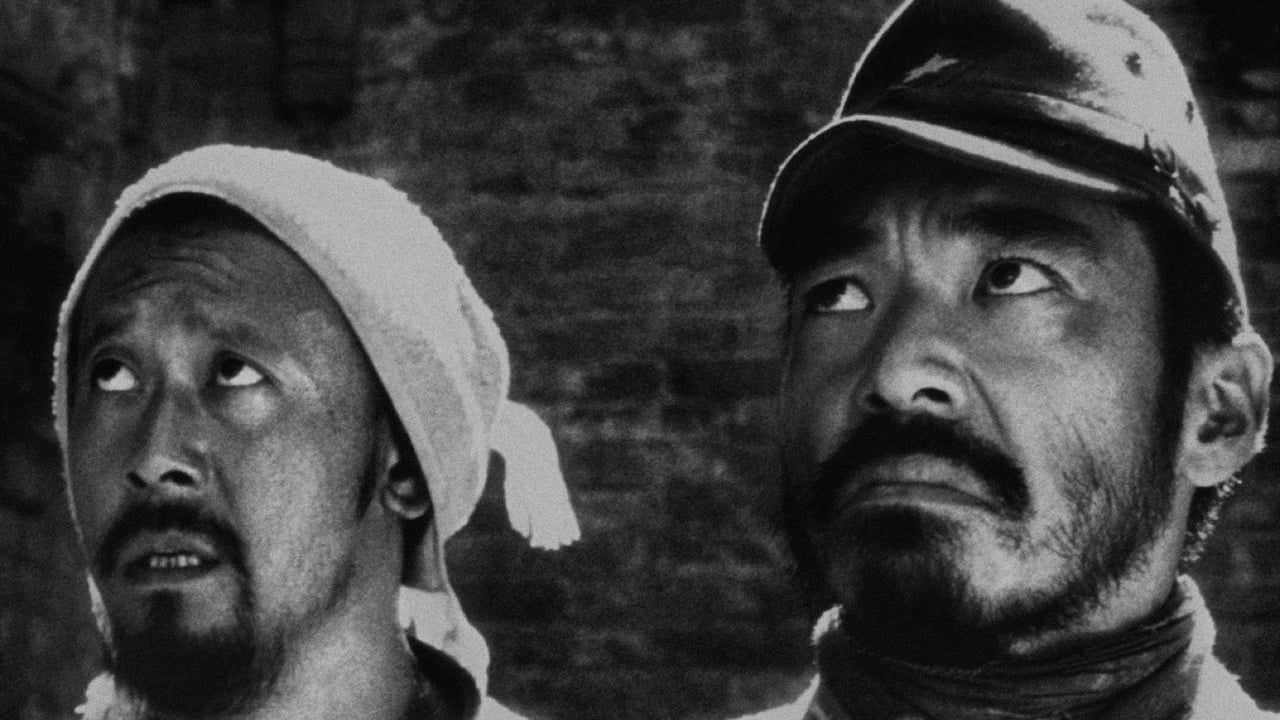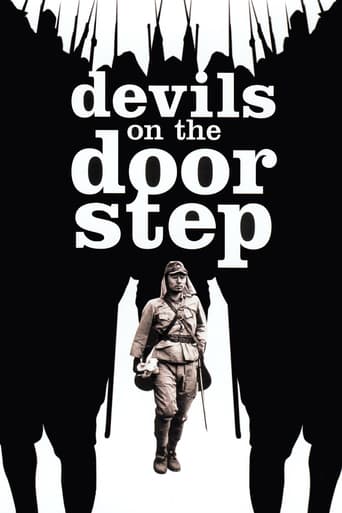

Fantastic!
... View MoreIt's a mild crowd pleaser for people who are exhausted by blockbusters.
... View MoreThere's a more than satisfactory amount of boom-boom in the movie's trim running time.
... View MoreThere are moments that feel comical, some horrific, and some downright inspiring but the tonal shifts hardly matter as the end results come to a film that's perfect for this time.
... View MoreWhen 'Devils on the Doorstep' was released in 2000, it was banned in China and its director, Jiang Wen, prohibited from directing any more movies for an unstated period of time. As it turned out, Jiang didn't direct another film until 2007. The film is set in a North Chinese town toward the end of the Japanese occupation in 1945. Apparently, the Chinese censors felt the film didn't cast the Japanese occupiers in a negative enough light as well as failing to depict the Chinese villagers as heroes.'Devils' is an unusual in that most of the film is a black comedy. The way Jiang depicts the Japanese occupation is quite different than the 'Rape of Nanking'. Here, the Japanese have occupied the small town of 'Rack-Armor Terrace' and have already settled in for eight years. There's no reign of terror here as the Japanese soldiers spend most of their time parading their musically-inept Navy band around town, who only happen to know one tune. Despite their contempt for the village they're in charge of, they basically leave the villagers to their own devices. The villagers are more upset about the lack of grain than the conduct of the Japanese soldiers.All that changes when an apparent partisan leaves a Japanese soldier and his Chinese collaborator-interpreter on the doorstep of our villager protagonist, Ma Dasan, tied up in gunny sacks, with orders to interrogate them and wait for his return, five days later, when presumably he'll return and take custody of them again. The partisan threatens both Dasan and his fellow villagers with death, if he doesn't cooperate.The captured Japanese soldier, Hanaya, is a caricature of the fanatical type of World War II Japanese soldier, often depicted in American propaganda movies during World War II. The Chinese interpreter, Hanchen, fearing that the villagers will kill both of them, intentionally mistranslates Hanaya's belligerent words, so that his captors will get the impression that he's actually benign (the joke of the villagers misinterpreting Hanaya's intentions, goes on for way too long). Ma Dasan informs his fellow villagers of his quandary and they agree that Ma Dasan should keep the captured soldiers in his cellar.After six months goes by and the partisan fails to return, the villagers agree to cast lots, to determine who amongst them, should execute the prisoners. Ma Dasan ends up being chosen but doesn't have the gumption to kill his captives, so he hides them in a watchtower along the Great Wall of China and brings them food and water. The villagers discover Ma Dasan's ruse when the prisoners fail in an escape attempt so they decide to hire an assassin, a bumbling, retired executioner by the name of 'One Stoke Liu'. Liu is completely incompetent and misses when he tries to slice off the prisoners' heads. At this point, one can hardly take the film seriously at all, as the characters (exemplified by such a buffoon), appear to be a bunch of bumbling fools. The same goes for two Japanese soldiers, who fail in their obsessive quest to capture a chicken as well as Ma Dasan's fellow villagers, who are constantly engaged in one petty argument after another.After Hanaya miraculously transforms himself from fanatic to grateful fan of his captors, he proposes that if the villagers release him, he'll approach the Japanese commander (Sakatsuka) and ask for two wagons of grain for the town. The ensuing scenario fails as satire, since it's too detached from reality. I can see why the Chinese censors took Jiang to task as no Chinese villager would be stupid enough to bring a captured Japanese prisoner back to a commanding officer, expecting not to be punished and worse, hope that said Commander ends up rewarding them, for their actions.Hanaya ends up as the one who's punished, as his death has already been reported to his hometown (where a memorial has been erected) and to now reveal that he's still alive (and was a prisoner of the Chinese to boot), would be a great humiliation for Sakatsuka and his unit. In a most unlikely reversal, Sakatsuka agrees to keep the agreement Hanaya made with the villagers and ends up giving them not just two wagons of grain, but an additional four.If all this seems unbelievable, Jiang decides to shift gears at film's end, dispensing with the overall comic tone. The jarring transition between black comedy and serious drama would have been much more effective had he had a little more empathy for his characters to begin with. So when things get 'serious', and the stakes are raised, we don't care much for what happens to characters who end up as tragic victims.As the plot unfolds, Sakatsuka turns on the villagers when they fail to produce the man who captured Hanaya to begin with and believes Ma Dasan has gone off to fetch some partisans. The paranoid outburst leads to the villagers being massacred (including a Japanese soldier murdering a young child) despite the fact that Sakatsuka already knows that Japan has surrendered.The coda is just as gruesome. Hanchen is executed by the Nationalists and Ma Dasan cracks up, and attacks Japanese POWs. Soldiers prevent him from hacking Hanaya to death and in a cruel twist, Major Gao, the Chinese Nationalist in charge, has Hanaya behead Ma Dasan, as punishment for his crimes.Jiang pulls out all the stops at irony, when a transformed Hanaya is forced to execute Ma Dasan, the good man who saved him but who went mad due to the cruelties of war. Jiang did well not to show the Chinese as completely heroic as the censors wanted, but went too far by turning them (along with the Japanese occupiers) into buffoons. When death finally came to the characters whom Jiang wanted us to laugh at earlier, their sudden demise hardly seemed tragic at all.
... View Moreup to now, this is my second favourest Chinese movie and only next to To Livegenerally, i don't call it a Chinse fighting-against-japan movie, which is always about a hero. it's about ordinary civilians struggle for survival under Japanese invasion.first of all, it's an idea to make this movie simply about a village and two war prisoners. when they came across a dilemma of take care of the prisoners, the village folks have to be very careful from being killed by either mysterious "me" or the japan invaders. but no matter how they tried, even to please the Japanese by singing, then got inevitably slaughtered.then instead of mandarin, we see local dialect is used in this movie. some words from the dialect really makes the movie interesting and the character alive. when i see this movie, i just feel they are not characters in a movie, but were ignorant/plain peasants living in northeast China. another wonderful element of language is the translation between japan and Chinese. it's really laughing when Hanaya tried to revile and annoy Ma Dashan & Yu'erfinally, it's a great success to shoot this film in black and white, by which the audience can be put in a real situation where the story happens. it's in color until the end when the Japanese surrender, perhaps it is to imply bright life is coming...one must-see for every average Chinese who won't want to forget the history of being invaded, especially when we see what the Japanese government does in the year of 60th Annivesary WWII
... View MoreLike Emir Kusturica's Underground, Devils on the Doorstep is a great, epic comedy-drama which examines how history can effect and destroy a small group of people. Like Underground, Devils mixes Rabelaisian humour with powerful drama to create a rousing, albeit bitter, commentary on the foibles of the human condition.I watched the 139 minute version at the San Francisco International Film Festival, and when the film was over, the audience broke out into thunderous applause. I believe that 139 minutes is long enough for this film, although it would be interesting to see the 162 minute version.Devils begins as a humorous comedy-drama examining how a group of Chinese villagers react to two Japanese POWS who are dumped mysteriously into their village. It is both touching and hilarious to see how the villagers deal with the POWS. However, Devils takes an unexpectedly tragic and violent turn in the last quarter of the film, when the realities of WWII destroy the lives of all the villagers.The climatic party scene near the end of the film is one of the best scenes I have ever seen- the laughter and joy at the beginning of the party cushion us for the horrific violence which ensues.Watch Devils on the Doorstep and enjoy the human comedy, but be warned about the last act of the film, which is unforgettably powerful and wrenching.
... View MoreDevils on the doorstep is a living proof that they can do beautiful and interesting historical films in China. Even if it is way too long (2 hours and 44 minutes) for this rather simple story, this film about the Japanese occupation of China, is well worth seeing if you get a chance.
... View More